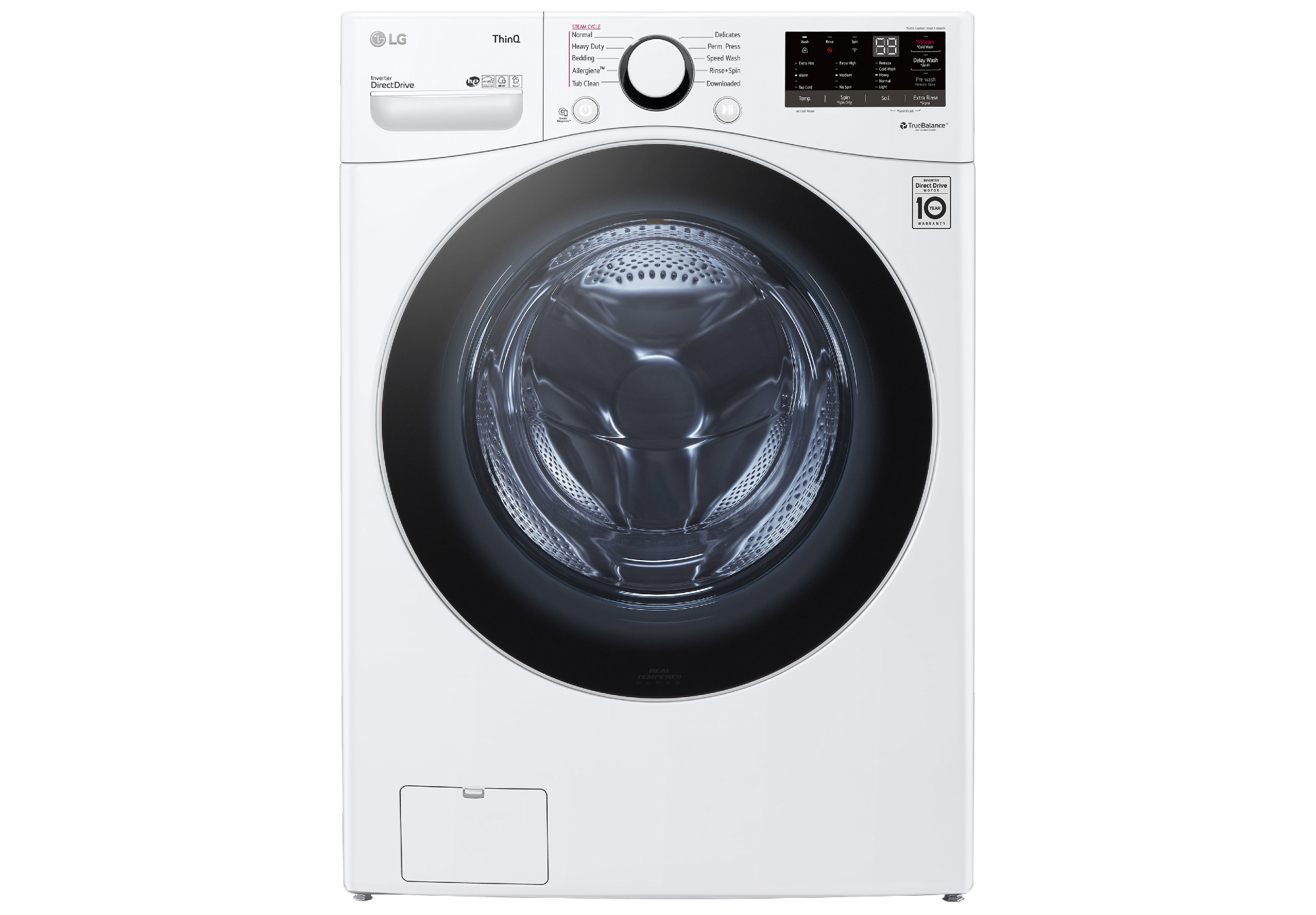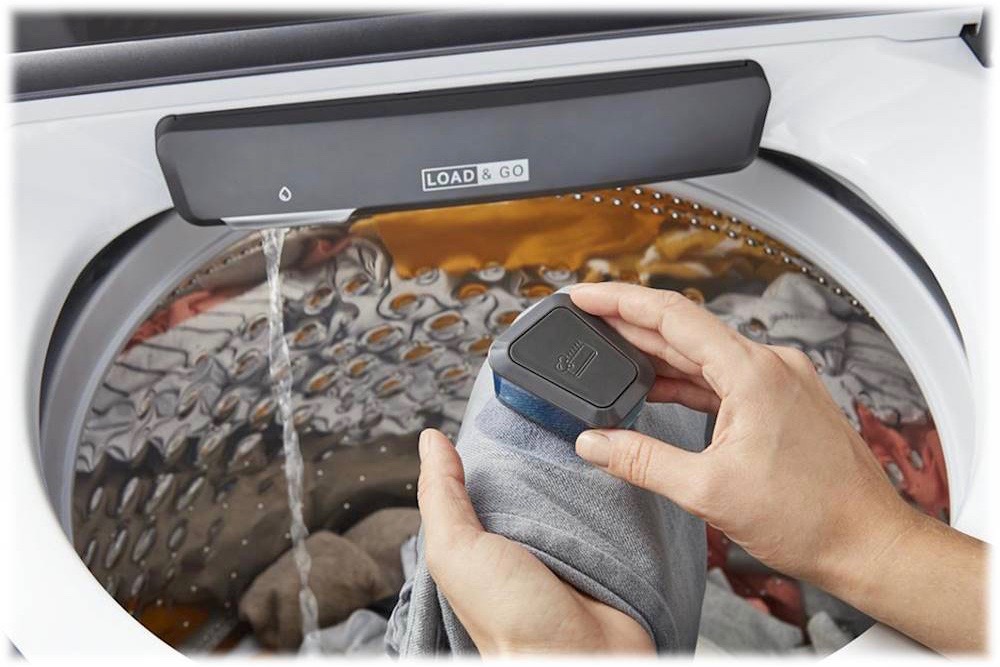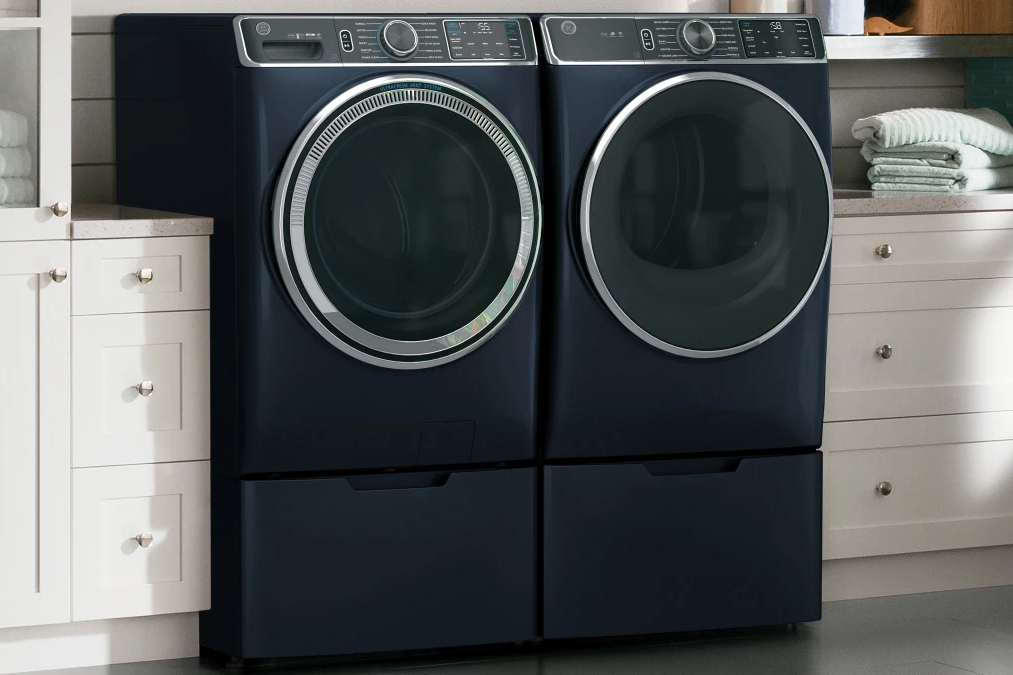
When it comes to must-have home appliances, a trustworthy washing machine is the king of all hardware. Standing toe to toe with other big domicile necessities like refrigerators and ovens, a solid washing machine should be able to handle any pile of clothing you throw at it. Even today's most basic washers feature a myriad of washing options for whatever material needs cleaning, along with cutting-edge web tools that, once your unit is paired to Wi-Fi, allow you to start and stop cycles remotely, check laundry status, and perform a diagnostic if something isn't working quite right.
Our current favorite model is the smart and affordable LG WM3600HWA. But we have plenty of other picks as well based on washer design preference, along with an extensive FAQ to help answer all your questions.








The best washing machine overall
LG WM3600HWA
- Special steam mode for allergies
- Excellent smart features
- Great choices for cold and speed cycles
- May be too compact for some households
LG has been making excellent washers for years, but this model is something we just don't see very often: A mix of smart capabilities, plentiful extra features, and an affordable price. At 27 inches and with a 4.5-cubic-feet capacity, it's also compact enough to fit in homes that may not have as much space.
The washer uses sensors and A.I. to detect fabric type and load texture so it can choose its own settings. Hook it up to Wi-Fi and connect to the ThinQ app, and it can even tell the compatible dryer what drying cycle will work best, too. In addition to the many traditional cycle choices, there are unique modes as well, like Allergiene, a steam cycle that's designed to remove the maximum amount of pollen and pet dander. There's also a dedicated cold cycle using LG's ColdWash tech, plus a SpeedWash cycle for a quick 15-minute clean.
We also like the anti-vibration system that keeps this washer from rattling around as much and the high-efficiency rating that saves on water and energy. The only downside is that this particular model may be too small for users who have lots of laundry to tackle. Fortunately, we have another great LG option for those cases.


The best large-capacity washer
LG WT7300CW
- Large capacity
- Six cleaning motions for thorough agitation
- Low-vibration design
- Not the absolute largest washer on the market
With the LG WT7300, you can expect to get a lot of laundry done fast. Its oversized 5-cubic-feet capacity is capable of churning a full comforter and all your king-sized bed linens in a single load.
One of our favorite features is LG's patented 6 Motion tech that calibrates every wash to utilize six distinct cleaning motions to get your clothes as clean as possible while minimizing wrinkles. Combine that with the unit's refined ColdWash setting for deeper cold-water cleaning and TrueBalance tech, which keeps your machine running quietly and without vibration, and you've got yourself a top-tier washer that can more than withstand an entire household of dirty laundry.
The LG WT7300 is not the biggest washer we’ve seen. Newish mega-capacity washers can offer as much as 5.7-cubic-feet of space and wash over 20 pounds of clothes at a time. But when it comes to features, size, and performance, this LG is still cavernous and has the cleaning quality to match.


The best front-load washer
Samsung FlexWash WV55
- Dual washer with smaller top washer
- Useful smart features
- Time-saving cycle modes
- Too big for some homes
We had the opportunity to test a version of the Samsung FlexWash in-house and found that it has a decent amount of space inside the machine (the front-load compartment has a capacity of 4.5 cubic feet and the smaller top compartment includes 1 cubic foot inside). This dual setup allows you to wash two separate loads simultaneously.
This means long gone — at least in theory — are the days of lazily stuffing your colors, whites, and darks into a single cold wash to save time. Similarly, the small albeit more than adequate top washer allows you to clean small daily loads and minimize the daunting weekly laundry day chore. You can also connect with your washer via the paired Samsung app to monitor cycles, remaining time, and other data, meaning you never have to prematurely leave your La-Z-Boy in the name of laundry ever again.
With Wi-Fi connectivity, SmartThings compatibility, vibration-reduction technology to reduce noise, and a variety of settings for your clothing, this washer is extremely feature-rich. Nonetheless, the Samsung FlexWash isn't without its flaws — our only real gripe about it is the overall size of the unit. With a base height of almost 47 inches, this washer is nearly tall enough to ride a host of roller coasters without an adult chaperone ... so those with an already cramped laundry room should look for more compact options.


The best top-load washer
Whirlpool WTW7120HW
- Load and detergent sensing
- More than 36 custom presets
- Smart updates
- An expensive pick
This top-load Whirlpool washer can do it all. Right off the bat, we're major fans of Whirlpool's Load and Go feature. Simply pour in a surplus of detergent and leave the rest to your machine. The washer will know exactly how much detergent to use based on a 20-cycle average. We're also really into the Adaptive Wash technology with Active Bloom. Once you dump in all the clothes of your cycle, the WTW7120HW calibrates water, detergent, and wash actions based on how much laundry is detected per load.
You can choose from a number of presets based on fabric options and dirt level or create up to 36 additional custom wash presets for whatever material and level of filth you'll be tackling. Once connected to Wi-Fi, there's a number of other great features at your disposal, including remote start/stop and status updates for your current load (available through the Whirlpool app for iOS and Android devices). While it's not exactly a budget model for those shopping for low prices, the Whirlpool WTW7120HW is packed with great tech, excellent wash cycle options, and optional web features to drive it all home.


The best smart washer
GE GTW840CPNDG
- Extra-large smart dispenser and other great smart features
- Built-in water station
- Water level and rinse customization
- May be too many features for those who want something simple to use
Many of the washers on our list have smart capabilities, but this 5.2-cubic-foot GE model goes beyond. It sports a list of capabilities that simply make the washer easier to use, especially if you have a smartphone nearby. That includes smart dispense technology, which can store up to 75 ounces of detergent and automatically detect how much each load needs. As with some of our LG and Samsung picks, you can also use your app to monitor the status of your laundry and receive notifications about when a cycle is done so that it doesn't sit too long.
There's also lots of customization. You can control the water level for a specific load in case you want to save water on a light load or do a deep fill for items that need extra attention. You can choose a prewash cycle to help remove caked-on dirt before the true wash begins. Even the rinse cycle allows you to choose options like extra rinsing, warm rinse, or deep rinse. There's also an Oxi cycle for adding an Oxi cleaner supplement to tackle any bacteria buildup.
Finally, this model also comes with GE's water station design, a type of faucet over the top of this washer that allows you to pre-treat clothes or rinse out containers. For those who love as many high-tech options as they can get, it's a great pick.


The best cheap washing machine
Kenmore 25132
- Affordable price
- Stain-boost option
- Express cycle available
- Lacks extra features
If there’s one thing that makes many top loaders attractive, it’s their price, and the Kenmore 25132 is no exception. While you won’t find a lot of the added features included with front-load machines, this appliance still has a wide variety of cycles and temperatures to choose from and a spacious 4.3 cubic feet of capacity — enough to wash 19 towels at once, according to Kenmore. There’s even a bulky/bedding cycle.
The washer lacks the deep-clean steam option found on pricier washers, but the stain boost helps clean up messes by letting clothes soak a while longer. Having that feature built-in means you won’t have to pretreat as many stains. For smaller loads you need clean ASAP, there’s an express cycle that takes around 45 minutes.
The control panel favors knobs over buttons, and there are quite a few: One to turn the stain boost on or off, one to include fabric softener or not, one to set temperatures, one to add an extra rinse, and the main one for the cycles. All of that makes navigating the settings fairly intuitive and less likely that you’ll forget to push a button amid a cluttered interface.
The Kenmore 25132 Top-Load Washer uses more water than its front-loader counterparts, but it does offer a lot of features for its price.


Best durable washer
GE GFW850SPNRS
- Venting system to prevent mold
- Mini-dryer option for small loads
- Smart detergent dispenser
- May be too large for some homes
One feature we see a lot of buyers asking about is durability — they want a washer that can last for as many years as possible. With an investment in such a large appliance, that's important! Front-loading washers are generally better for durability, as they let their drums and gravity do a lot of the work. However, they can also develop problems with things like mold buildup. This latest model from GE uses a unique venting system to make sure the excess moisture is evaporated and the drum stays clean.
Combine this with the quality GE design and other welcome GE features like dynamic balancing to avoid shaking, and this washer was clearly made to last. However, it also includes several bits of smart technology that we enjoyed, including notifications about laundry via Wi-Fi and the SmartDispense container that holds a whole bottle of detergent and measures it out based on the size of the load. There's even a wash-and-dry feature for very small loads that uses the washer's heating system to dry the load right from the washer, saving you a cycle.

Frequently Asked Questions
When buying a washing machine, there are a variety of factors you’ll want to consider. In addition to considering your preferences, your budget, and making sure your machine fits your laundry room, you’ll also want to think about the size of your household and the characteristics of each person (and their clothing). Do you have fashion-savvy teenagers? Does your household contain businesspeople who need to care for professional attire? Or, perhaps you live with people who typically just need to wash sweats, jeans, and tees?
If you have a large household and the people in your home have a variety of different types of clothing, you might need a higher-end washer with different care options and cycles. If you have kids, you might need a machine that’s a beast at fighting stains. On the other hand, if you have a household of adults who wear easy-to-wash fabrics like polyester and cotton, you can probably go with a more basic and inexpensive washing machine.
LG is one of the most reliable front-load and HE washing machine brands, according to Consumer Reports data. Brands like Maytag, Kenmore, Electrolux, Samsung, Whirlpool, and GE also earn high marks in terms of reliability.
A front-load washer fills a stainless steel drum with a small amount of water (to a level below the door's opening). Then, the drum spins, and the laundry gets caught in vanes and travels to the top of the machine and back down.
A top-load washer usually has a ceramic drum, and it fills up with more water. An agitator moves the clothing around the drum to get the clothes clean.
There are benefits and drawbacks to both types. A front-load washer uses less water and tends to be gentler on fabrics. However, front-loaders can be more expensive than their top-load counterparts, and a front-loader also requires more bending over.
Hot water alone will not necessarily kill bacteria, as the washer's hot water temp is typically only around 130 degrees. If you use a disinfectant like Lysol or bleach, you can sanitize your clothing in the washing machine. Lysol Laundry Sanitizer claims to kill 99.9% of bacteria if you add it to the rinse cycle.
A big mistake some people make when choosing a washer is opting for an overly cheap machine and compromising on features that make their life easier. Reliability, value, and compatibility are paramount. But, it’s also important that you don’t buy a washer that makes you hate laundry day even more because it doesn’t do what you need it to. If you need to wash your kid’s uniform separately from your clothes, shell out the extra cash for a dual-wash machine. If you need a large machine, pay the extra cash for a larger-capacity washer. You'll be happy you did come laundry day.
Smart washing machines connect to your smart home network via Wi-Fi so you can operate the machine remotely, voice control the machine, and get status updates and messages pertaining to the maintenance and well-being of your washer.
Between each cycle, leave the door open and allow your washer to air dry. This will help prevent mildew from building up in your machine. You can also run a cycle of vinegar through your empty washer, purchase washing machine cleaning products like wipes or tablets, and run a clean cycle. Learn more about how to clean a washing machine here.
No. Using regular non-HE detergent in an HE machine is not recommended.
Yes. HE detergent is designed for machines that use less energy and water, but you can HE detergent it in a regular machine provided you read the instructions to determine the correct amount to apply for the size of your load.
You should expect your washing machine to last at least eight to 12 years provided you maintain it properly.
If your washing machine isn’t performing the way you want it to, making your life harder (instead of easier), leaking, or using too much energy or water, these are all good reasons to replace your washer.
If you are like a lot of shoppers, you will probably wait for your old washer to break down before looking into purchasing a new one. However, the best time to buy a washer often correlates with some warning signs as well as the well-placed timing of the manufacturer's sales. A lot of appliance manufacturers release their new products early in the fall. As these new models appear in showrooms, you can expect to find discounts on older washers to make some room.
You can’t always bank on that being the case, though. It’s common for stores to have significant sales around the holidays. Black Friday, President’s Day, Memorial Day, and Labor Day aren’t the only times for bargains.
It’s pretty often that you may find sales at your local appliance shop. They often have annual sales that will offer you major discounts on brand new washing machines. The timing of these sales can vary a bit — we found that one Seattle-based dealer has an annual sale in early November where countless customers flock to the store for noticeable savings.
Washing machines are major investments because you’ll most likely use them several times a week and need them to work best for your needs. Since we don’t know what each person needs, we use broad requirements that most people will benefit from and structure our reviews around those features. Our reviews combine research, careful observation of objective characteristics and subjective features — like the visual appeal of an appliance — and how well it functions overall.
The Digital Trends staff also provides feedback because they use various brands and models of washing machines and can tell us exactly how well the appliances perform. We truly refer back to multiple opinions and rounds of testing and come to a collective idea for our guide.




